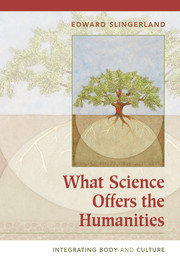Book contents
- Frontmatter
- Contents
- Figures
- Preface
- What Science Offers the Humanities
- Introduction
- PART I EXORCISING THE GHOST IN THE MACHINE
- 1 The Disembodied Mind: Problems with Objectivism
- 2 They Live Among Us: Characterizing Postmodernism in the Academy
- 3 Pulling the Plug: Laying to Rest Postmodern Epistemology and Ontology
- PART II EMBODYING CULTURE
- PART III DEFENDING VERTICAL INTEGRATION
- Conclusion
- Appendix: Embodying Culture: Selected Bibliography and Other Resources
- References
- Index
1 - The Disembodied Mind: Problems with Objectivism
Published online by Cambridge University Press: 05 June 2012
- Frontmatter
- Contents
- Figures
- Preface
- What Science Offers the Humanities
- Introduction
- PART I EXORCISING THE GHOST IN THE MACHINE
- 1 The Disembodied Mind: Problems with Objectivism
- 2 They Live Among Us: Characterizing Postmodernism in the Academy
- 3 Pulling the Plug: Laying to Rest Postmodern Epistemology and Ontology
- PART II EMBODYING CULTURE
- PART III DEFENDING VERTICAL INTEGRATION
- Conclusion
- Appendix: Embodying Culture: Selected Bibliography and Other Resources
- References
- Index
Summary
In chapter 51 i am going to try to make the case that there is something special about science as a discourse – and that it has nothing to do with the socially constructed prestige of men and women in white lab coats. I will also argue that, in an important sense, the type of physicalist explanations advanced in the natural sciences take explanatory priority over human-level explanations. First, though, it is important to recognize the limitations of more traditional models of science and the legitimacy of some of the arguments that have come out of the science studies movement. Because humanists are my target audience for this book, this critique of objectivism will be less detailed than that of postmodernism in Chapters 2 and 3 – in our “post-Kuhnian” age, the limitations of objectivism have become something of a truism. What I am going to call “objectivism-rationalism” (or “objectivism” for short) has, since its heyday among Enlightenment humanists, seen its realm of absolute sway reduced mostly to philosophy departments, although it is still prevalent in history and classics and – in the form of folk realism – functions as a kind of default position for humanists who are not inclined toward “Theory.”
The bulk of this chapter is concerned with both theoretical and empirical problems with the objectivist model of the self, the representational model of knowledge, and the objectivist-rationalist model of human decision making and action.
- Type
- Chapter
- Information
- What Science Offers the HumanitiesIntegrating Body and Culture, pp. 31 - 73Publisher: Cambridge University PressPrint publication year: 2008



